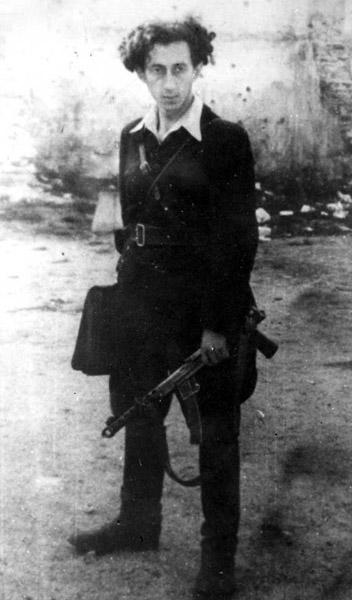“…She was not my mother, of course. My mother turned to ashes in Ponary [the killing site of Vilna’s Jews]. This short Christian woman, with soft eyes behind thick glasses, is called Anna Borkowska. These eyes were looking at me in the winter of 1941…. We were hiding behind the doorframe of a abandoned house in a deserted alley near the ghetto’s gate, and she said to me:
‘I beg you, let me come into the ghetto’
‘what for, Ima [mother in Hebrew],’ I asked.
‘To be with you’.
Being in a hurry I tried to dismiss her request with a gesture. I didn’t grasp the import of her words. ‘Why in God’s name do you want to do this?’ I asked jokingly.
‘Because God is now in the ghetto’, she whispered.
‘God is in the ghetto?’, I repeated like an echo and almost laughed. It was not only the cold that made me shiver.
She didn’t enter the ghetto that day. I begged and pleaded with her to leave as long as it was possible. As we parted she touched my arm, paused and then said: ’When you left, I prayed for you. This is not enough. What else can I do for you?’.
Anna Borkowska, whose name we didn’t know at that time, was the mother superior of a convent of Dominican sisters in the suburbs of Vilna. There were nine sisters, and about the same number of hiding Jews. On the day my friends and I left the haven we had found under her roof, she wouldn’t believe that we would not be returning to the safety of her shelter.
‘Grenades’, I said, ‘If you could get us grenades – that is what we need’. Not a muscle moved in her thin face. She said: ‘may God be with you, my son’, and left.
Two weeks later she brought the grenades. The meeting place this time was in the city center, far away from the ghetto wall. She quietly took the grenades out from the wide sleeves of her gown, and gave them to me like someone who was placing his loved fledgling in another persons lap. These were the first three grenades of the FPO (the United Partisan Organization)….
I never asked her what she thought when she gave the three grenades to a Jewish man who was returning to the ghetto. But forty years later, I found her again, and she was no longer a nun, but an old lonely lady in Warsaw. And I was privileged to give her the medal of the Righteous Among the Nations. Only because of her frailty was the ceremony held in Warsaw and not in Jerusalem – as she and we had wished. And she fluttered around in the festive hall of the Polish Center of Former Fighters of the Anti-Nazi Underground, facing the TV cameras, like a caged bird; she did not understand what the commotion was all about. ‘I only did my duty’, she muttered, ‘only my duty’.
….All of a sudden she turned to me and asked: ‘Isn’t it true, my dear, that you always were a believer?’
‘Right’, I said with embarrassment.
…At the same ceremony when the Righteous Among the Nations award was bestowed on her, as I spoke to her and the Polish audience, I called her Ima in Hebrew, and then went on to speak in Polish. What I said had an immediate and different connotation in the Polish and Catholic language: ‘During the days when angels hid their faces from us, this woman was for us Anna of the Angels. Not of angles that we invent in our hearts, but of angels that create our lives forever’.







